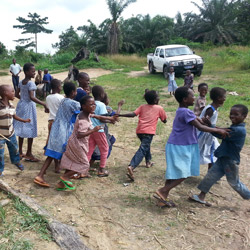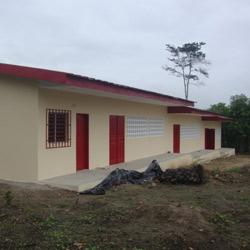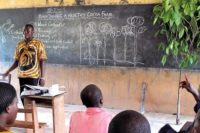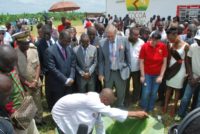Hershey, Barry Callebaut team up to build primary school in Ivory Coast
Rural school will provide educational facilities and nutrition and health support for more than 150 children.

As part of their ongoing commitments to support farmer communities in cocoa-growing regions, The Hershey Company and Barry Callebaut announced the completion of a new primary school, community and farmer training center in the western cocoa-growing region of Côte d'Ivoire.

|
Located in the Abokro, Gabiadji, Bas-Sassandra region of Côte d'Ivoire, the school and community center will be fully operational for the 2013-14 school year. About 150 primary-school-age children from 24 nearby hamlets and villages are enrolled in the new school. The project is a joint community partnership between Hershey and Barry Callebaut.
The rural regions of Côte d'Ivoire suffer from a lack of modern primary school buildings and the new Abokro school will address a long-standing community development need. The Hershey Learn to Grow Abokro school includes three furnished classrooms equipped with solar-powered lighting fixtures, a solar-powered water well, an infirmary, a school canteen at which subsidized meals will be offered, as well as housing for professional teachers and medical staff. Barry Callebaut has previously constructed a medical facility in Goh and the company processes large volumes of cocoa at its nearby San Pedro facility.
"This modern school will make primary education far more accessible for the children of Abokro who today face many challenges," Mike Wege, Hershey's senior v.p. - chief growth officer. "Through this innovative project, children will receive a meal at midday, good medical care and instruction from professional teachers. Both our companies are committed to giving back to cocoa communities and the new Abokro school is a great example of what we can achieve together."
The Hershey Learn to Grow initiative underscores the company’s commitment to serving communities in cocoa growing regions. It modernizes cocoa farming techniques, increases the yield of cocoa production, and thus improves the livelihoods of cocoa farmers and their families.

|
In Côte d'Ivoire, the Hershey Learn to Grow program will focus on primary education through the Abokro school project, but will also include cocoa farmer training in partnership with Barry Callebaut's Cocoa Horizons program.
The Abokro primary school is a registered public school and its operation will be managed by the Ministry of Education. The infirmary will be staffed and operated by a professional health worker assigned by the Ministry of Health. Barry Callebaut's local subsidiary SACO, on behalf of Barry Callebaut and Hershey, will work with a school committee regarding future development activities. The school committee will be comprised of teachers and community members, including representatives of the Cooperative Agricole de Glibeadji (COOPAGLI).
COOPAGLI, a cocoa-growing cooperative and beneficiary of the project, is a member of the Union des Cooperatives Agricoles (UCAS) in Côte d'Ivoire. The Cooperative consists of nearly 900 farmers, and is one of 20 co-ops in the UCAS union. The union has long been engaged in Barry Callebaut's Quality Partner Program and projects to improve the income and livelihoods of cocoa farmers.
"The Abokro project is the result of a unique collaboration between Hershey, Barry Callebaut and the farmers of COOPAGLY, and it illustrates our holistic approach in working with cocoa farming communities under the Cocoa Horizons framework," said Paul De Petter, v.p. - cocoa Africa at Barry Callebaut. "The project integrates agricultural training, which gives farmers the knowledge to increase crops yields and income, and it provides access to education, water and basic healthcare, which improves the livelihoods of farmers and their families."

|
Cocoa Horizons is Barry Callebaut's global initiative to ensure sustainable cocoa production by working with farmers to enhance yields and quality, training the next generation of cocoa farmers, and improving access to clean water and basic healthcare for cocoa framers and their families. Both companies believe the development of these programs is essential for both the livelihoods of the cocoa farming community and their families as well as business growth.
Looking for a reprint of this article?
From high-res PDFs to custom plaques, order your copy today!







